1. Stevie Wonder
By the tender age of 20, Stevie Wonder had already transcended the norms of Motown's production line, embarking on a journey that would see him amalgamate soul, pop R&B, funk, and jazz into a sound distinctly his own. His prolific creativity during the 1970s is evident in the eight studio albums released, brimming with tracks that climbed to the summit of charts.
Hits like "Superstition," "You Are the Sunshine of My Life," and "Sir Duke" not only engraved his name on the number one spots but also earned him 12 Grammys out of a legendary total of 22. Despite his youthful initiation into the industry, Wonder's music from the '70s—a striking blend of lyrical depth and melodic innovation—remains a bedrock for modern music virtuosos, demonstrating an enduring legacy.
His lasting relevance is a testament to a career built on exceptional artistry and musical exploration, making Stevie Wonder a shining emblem of genius and resilience in the music world.
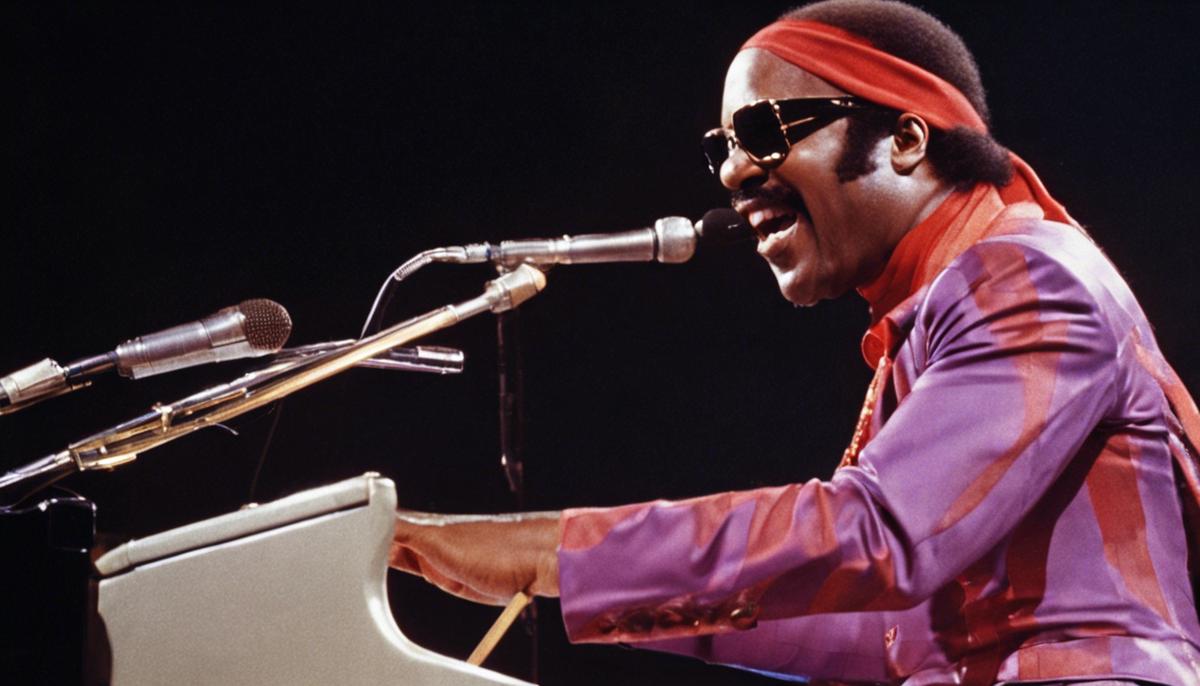
2. Led Zeppelin
In the realm where guitar strings met with mystique, Led Zeppelin reigned supreme, their legacy woven with the raw energy of rock. Their discography during the '70s reads like a chronicle, each album marking their ascent to immortality in the annals of music. Yet, it was more than their chart-topping albums and genre-defining anthems that etched Led Zeppelin into the heart of the decade; it was their ability to venture where few bands dared.
Guitars wailed and drums thundered as Led Zeppelin transformed rock 'n' roll into something otherworldly. Albums like "Led Zeppelin IV" and "Physical Graffiti" weren't merely collections of songs but voyages into unexplored territories of sound. The band's prowess didn't stop at their studio work. Their concerts were revered events where magic unfolded—Led Zeppelin wasn't just performing; they were an unstoppable force, enveloping audiences in an experience many describe as transcendent.
Yet, beneath the facade of gods wielding instruments, the members were passionate craftsmen, diligently honing their art. The intricate tapestry of melodies and lyrics was the result of relentless creativity and innovation. In Jimmy Page's wielding of the guitar, Robert Plant's soaring vocals, John Bonham's earth-shattering drumming, and John Paul Jones' harmonic fluency, Led Zeppelin embodied a symphony of sonic excellence that elevated them beyond mere musicians to architects of an era.
Even as time marches on, Led Zeppelin's influence remains indelible, a beacon for those who venture into the realms of rock. They gifted the '70s a legacy of limitless imagination in rock music, demonstrating that boundaries exist only to be transcended. As new generations discover their catalog, Led Zeppelin continues to gather faithful followers, proving that true legends never fade—they only grow louder in the echoes of their influence.
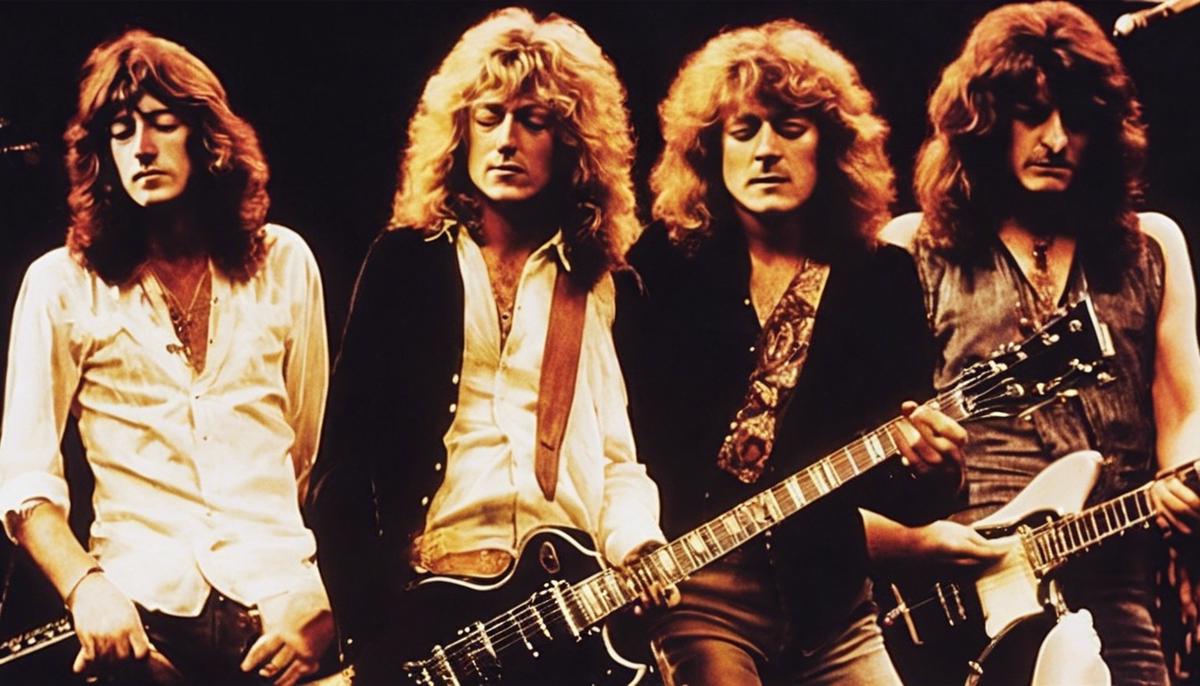
3. David Bowie
David Bowie was the very embodiment of the 1970s' spirit of reinvention and exploration. Each album from this decade was a doorway to a new dimension, where music and persona melded into a vibrant tapestry of sound and vision. Departing from traditional rock, Bowie's forays into glam rock, electronic, and experimental music were pioneering and revolutionary.
With "The Rise and Fall of Ziggy Stardust and the Spiders from Mars," Bowie introduced the world to his alter ego, Ziggy Stardust – a rock star from another galaxy. This character wasn't merely a stage persona but a narrative, weaving through tracks that broke new ground in sound and storytelling. Through "Ziggy," Bowie challenged both gender norms and musical boundaries, crafting an experience that was as intellectually stimulating as it was enchanting.
His adaptability was unmatched. From the folk-inflected whimsy of "Hunky Dory" to the dystopian hues of "Diamond Dogs," Bowie proved time and again that his artistry was bound by neither genre nor expectation. Tracks like "Life on Mars?" and "Rebel Rebel" were anthems for a disillusioned generation, encapsulating the zeitgeist of an era caught between the fading glow of the '60s optimism and the harsh light of '70s realism.
"Heroes" stood as a testament to Bowie's ingenuity. Recorded in a divided Berlin, the title track is a love letter to perseverance in the face of desperation, a theme that beautifully mirrors the fractured times out of which it came. It showcased Bowie's ability to reflect and influence the cultural currents of the time, positioning him as an artist deeply embedded in the fabric of his era.
Though he'd go on to reinvent himself countless times, the '70s were perhaps Bowie at his most impactful. He ensured his legacy would be one of eternal reinvention—a star whose light refuses to fade, reminding us that identity is as fluid as the music that accompanies it. He crafted epics for the soul, leaving an indelible mark on the canvas of contemporary music. His journey through the decade was a mirror to society's own search for meaning in an ever-changing world, making David Bowie not just a musician of the '70s but its defining spirit.
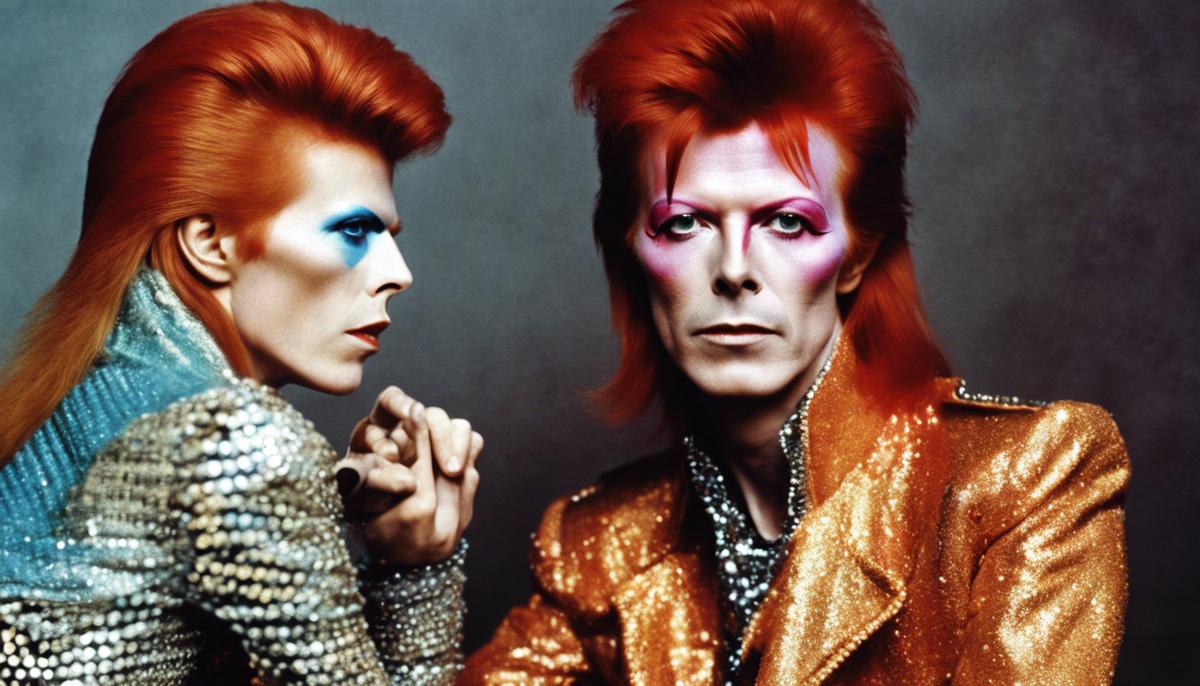
4. Fleetwood Mac
Fleetwood Mac's opus, 'Rumours,' danced in the dichotomy of personal disarray and musical brilliance. In a decade defined by both excess and introspection, this ensemble cast of musical geniuses turned their own turmoil into a symphonic masterpiece that echoed the complexities of human relationships through intoxicating harmonies and poignant lyrics. It was a testament to the band's resilience through personal struggles, churning out an album that was as turbulent behind the scenes as it was serene to the listeners' ears.
Stevie Nicks weaved spells with her words, her ethereal voice a beacon drawing listeners into the fold, while Lindsey Buckingham's guitar strummed to the rhythm of raw emotions, weaving a tapestry of sound that was both haunting and euphoric. The push and pull of their tumultuous relationship, documented in tracks like "Go Your Own Way," laid bare the soul of the album, making 'Rumours' a crucible for their collective pain and passion.
Christine McVie's songwriting and vocals brought a sense of buoyancy, a balance to the chaos, her tunes like "Don't Stop" serving as reminders of the light at the end of the tunnel. The rhythm section, Mick Fleetwood on drums and John McVie on bass, provided the strong backbone needed to carry the weight of such emotionally charged content, propelling the band into the annals of rock history.
In an era where authenticity battled with artifice, 'Rumours' stood as an unguarded chronicle of the human condition, channeling the band's internal discord into a harmonious blend of tracks that struck a chord with a generation. It wasn't merely listened to; it was felt. Their stories of heartbreak, longing, and redemption became everyone's story, a shared soundtrack for moments of personal reflection and collective understanding.
Fleetwood Mac's 'Rumours' transcended the boundaries of rock, pop, and blues to become a cultural landmark. With over 40 million copies sold worldwide,1 its legacy is not just in the platinum plaques but in its enduring appeal that spans generations. It serves as a monument to the beauty that can emerge from turmoil and the artistry possible when we channel our sincerest emotions into our creations. In embracing their imperfections and laying them bare for the world to see, Fleetwood Mac ensured 'Rumours' was more than just an album; it was a bridge connecting the personal with the universal, forever encapsulating the spirit of a decade rife with change.

5. Pink Floyd
Pink Floyd's 'Dark Side of the Moon' marked a turning point not only for the band but for the entire realm of music. Released in 1973, this album became an extraordinary chronicle of human emotion, weaving together themes of conflict, greed, time, and mental illness, all set to a backdrop of experimental sounds and meticulously crafted lyrics. It was an odyssey into the abyss of the mind, underscored by some of the most iconic rock instrumentals ever recorded.
What sets 'Dark Side of the Moon' apart is its relentless pursuit of authenticity, reflected in each chord's echo and every haunting lyric. From the opening heartbeat of "Speak to Me" to the concluding refrains of "Eclipse," Pink Floyd orchestrates a voyage through the human condition, challenging listeners to confront their fears and aspirations. The album resonates with Roger Waters' poignant lyricism and David Gilmour's guitar virtuosity, harmonized with Richard Wright's atmospheric keyboards and Nick Mason's precise percussion to create a soundscape that was light-years ahead of its time.
- "Time" delves into the universal anxiety over life's fleeting nature, revealing an introspection that was both deeply personal and acutely existential.
- "Money" brings a jarring critique of capitalism's stranglehold on society, fusing biting satire with groundbreaking sound effects that transformed mundane sounds into resonant statements.
- "Brain Damage" touched on madness with a frankness rarely seen in rock music, establishing a connection with listeners wrestling with their own demons.
Pink Floyd's masterpiece was more than just an auditory experience; it was a full-bodied immersion into sound. The seamless integration of innovative studio techniques, like looped audio snippets and synthesizer melodies, together with philosophical introspection, captured the zeitgeist of an era filled with turmoil and change. It became a solace for those trying to make sense of a world that seemed increasingly out of control, offering not only an escape but a deep communal understanding.
Today, 'Dark Side of the Moon' holds a place not just in music history but in the cultural lexicon as a symbol of the power of art to transcend boundaries, encapsulating often indescribable aspects of the human experience. Its legacy continues to expand with every listening, reminding us that amid the chaos, there's music that can bring us back to ourselves.
Following 'Dark Side of the Moon,' Pink Floyd secured their status as pioneers capable of marrying profound existential ponderings with sonic innovation. As the album's echo lingers through time, it's clear: they created a timeless portal to the depths of the human spirit, proving that within the dark side of life, there's light to be found.
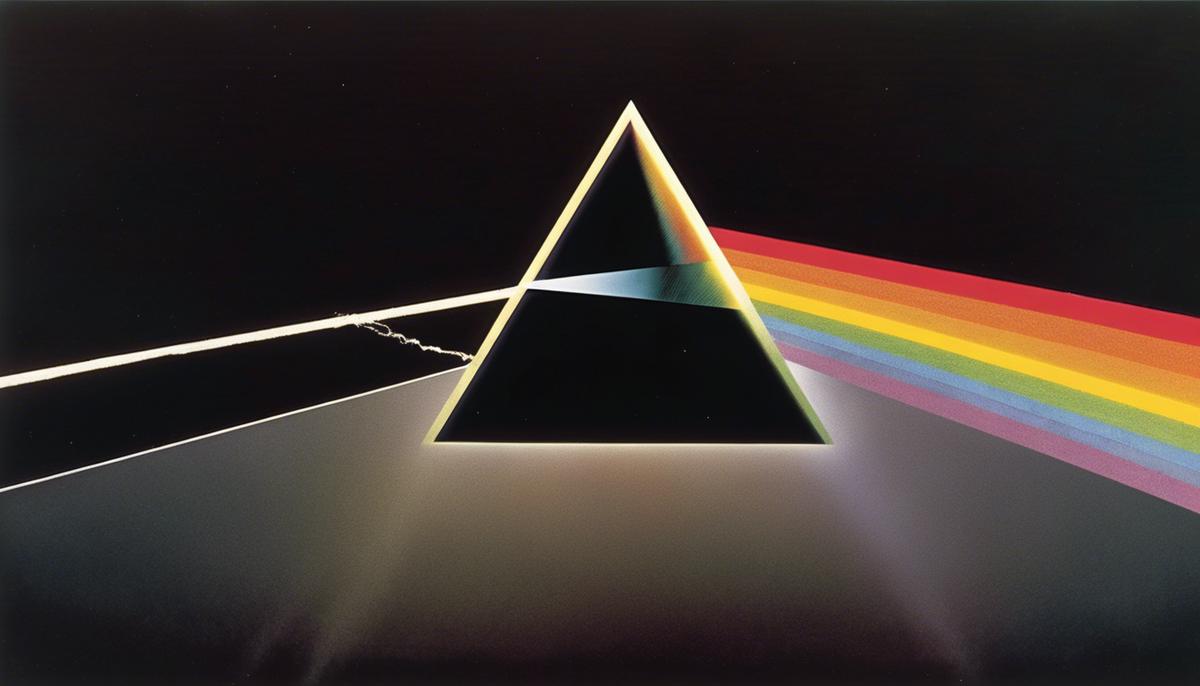
6. The Rolling Stones
The Rolling Stones' journey through the 1970s embodies the dissonant chaos and unbridled fervor of an era wrestling with its own identity. At a time when music veered between the ethereal melodies of disco and the raw heartbeat of punk, The Rolling Stones carved out their own defiant path with smoldering tracks that captured the collective consciousness.
Mick Jagger's electric stage presence, married with Keith Richards' legendary guitar riffs, turned concerts into fervent gatherings. It was this combination of swagger and vulnerability, wrapped in the dusky vocals of Jagger and the band's gritty instrumentation, that propelled them into rock royalty. The Rolling Stones delved deeper into the soundscape of rebellion, churning out anthems that were both a mirror to society's upheavals and an escape from them.
"Brown Sugar," "Angie," and "It's Only Rock 'n Roll (But I Like It)" were emblematic of the times — gritty narratives woven into the fabric of the decade. Each riff, each chorus resonated with the frenetic pulse of an era caught between the dying embers of the '60s dream and the stark reality of a world under duress. The Rolling Stones emerged not merely as observers but as narrators, documenting the human saga in its rawest form.
Beyond their music, The Rolling Stones became synonymous with the unapologetic pursuit of freedom. Their off-stage exploits and controversies served to cement their place in music history, not just as musicians but as icons of an attitude that defined a generation. The band's trajectory through the '70s was a relentless pursuit of artistic evolution, pushing boundaries and challenging norms, all while staying true to their core.
As the decade waned, The Rolling Stones had firmly entrenched themselves as the standard-bearers of rock 'n' roll's enduring spirit. Their legacy from these tumultuous years was a testament to the enduring power of music to inspire, challenge, and unite. The band's sonic exploration during this time laid the groundwork for future generations of musicians, proving that true artistry is born not only from talent but from the courage to traverse the unknown.
The Rolling Stones' odyssey in the 1970s was a vivid tableau of rock 'n' roll at its most unyielding. As they undeniably inscribed their name across the decade, one thing became clear: The Rolling Stones weren't just part of the '70s—they were an indomitable force that helped define it.
7. Bob Dylan
Bob Dylan's story during the 70s captures the essence of an era that was both tumultuous and transformational. Through albums like 'Blood on the Tracks,' Dylan delved into the profound complexities of human emotion, transporting listeners to realms of reflective contemplation. His narratives weren't just heard; they were experienced, etching themselves into the fabric of those who lent an ear to his folk-infused ballads.
In an epoch saturated with disco and emerging punk, Dylan's folk tunes transcended categorization, emerging as beacons of poetic clarity. The album 'Desire,' with its vivid storytelling and captivating rhythms, served as a profound journey into the heartaches and joys of existence. Dylan's craftsmanship shone brightest when he wielded his harmonica, turning each note into a melancholic echo of the human condition.
Dylan's remarkable ability to articulate the zeitgeist of the time through poetic lyrics set him apart. His songs became anthems for those wandering through the introspective wilderness of the 70s, seeking solace in his words. Tracks like "Tangled Up in Blue" and "Simple Twist of Fate" were windows into Dylan's soul, mirroring the collective consciousness of a generation wrestling with their identities.
Yet, it wasn't all introspection. Bob Dylan's "Hurricane," a blistering critique of injustice and a fight for redemption, showcased his prowess as a storyteller par excellence. Dylan proved that his music wasn't confined to personal ruminations; it was a pulsating vein running through the heart of societal discourse.
Dylan's contribution to the 70s was an invigorating blend of biographical poignancy and cultural commentary, etched into records that have since become timeless. His ability to navigate the personal and political with equal dexterity rendered him a chronicler of the human experience, an auditory cartographer mapping the contours of the heart against a backdrop of social upheaval.
As we venture further from the 70s, Dylan's music retains an enduring allure, a testament to its profound influence on individuals and the collective fabric of music history. Bob Dylan didn't just sing through the 70s; he narrated it, leaving an indelible mark on the canvas of music and forever securing his place as the bard of a generation in flux.
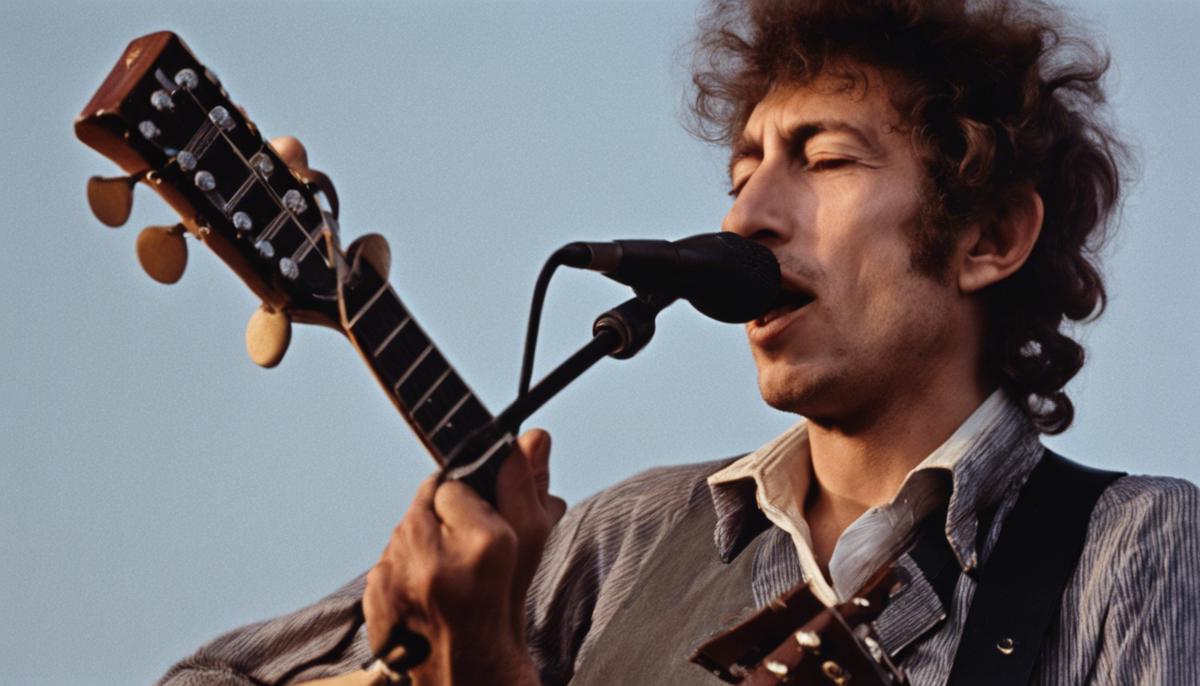
8. Elton John
Elton John's escapade through the 70s was a supernova, casting a radiant glow over the musical landscape of the time. John was more than just a pop icon; he was a theatrical phenomenon whose piano-laden compositions and soul-stirring narratives transformed the mere act of listening into an immersive experience. His hits spanned the gamut of human emotion, enchanting listeners with their lyrical depth and melodic richness.
From the introspective journey of "Rocket Man" to the poignant nostalgia of "Goodbye Yellow Brick Road," Elton John's songs were odysseys that whisked audiences away to lands of sonic splendor. Each performance was an extravaganza, an invitation to partake in the wonders of a world where music and magic intertwined. John's partnership with lyricist Bernie Taupin contributed to this alchemy, birthing songs that transcended time and genre.
John's command over the ivories was unmatched, his development from shy prodigy to global superstar a narrative steeped in personal triumphs and trials. Hits like "Bennie and the Jets" and "Tiny Dancer" showcased his versatility and connection to the zeitgeist, tapping into the pulse of an era vibrant with change and challenging norms. His music became a sanctuary for those adrift in the complexity of their identities and the tumult of the times.
More than a performer, Elton John was a cosmic force in the 70s, his concert stages akin to altars where devotees gathered to celebrate the sacrament of his sound. His music videos and live performances were spectacles of sartorial and sonic expression, breaking ground and shattering expectations. Costumes and chords were his tools of revolution, dismantling conventions and adorning the ordinary with extraordinary glamour.
Yet beneath the glitz lay a craftsman with an innate understanding of melody and heart. Amid the flamboyance, Elton John navigated fame with a pianist's soul and a poet's pen, scripting anthems for the hopeful, the heartbroken, and everyone in between. His decade-spanning oeuvre in the 70s was a mirror held up to society, reflecting its flaws and beauty, its despair and dreams.
As the 70s waned and new decades dawned, Elton John's legion of fans remain, testament to the timelessness of his artistry. He etched his name into the hearts of those who bore witness to his meteoric rise—a luminous architect of a musical bridge that connected generations. Elton John fashioned not just songs but monuments of sound, legacies of a spirit indomitably radiant. In doing so, he didn't just define an era; he gifted it immortality through melody, becoming not only the soundtrack of the 70s but of lifetimes.
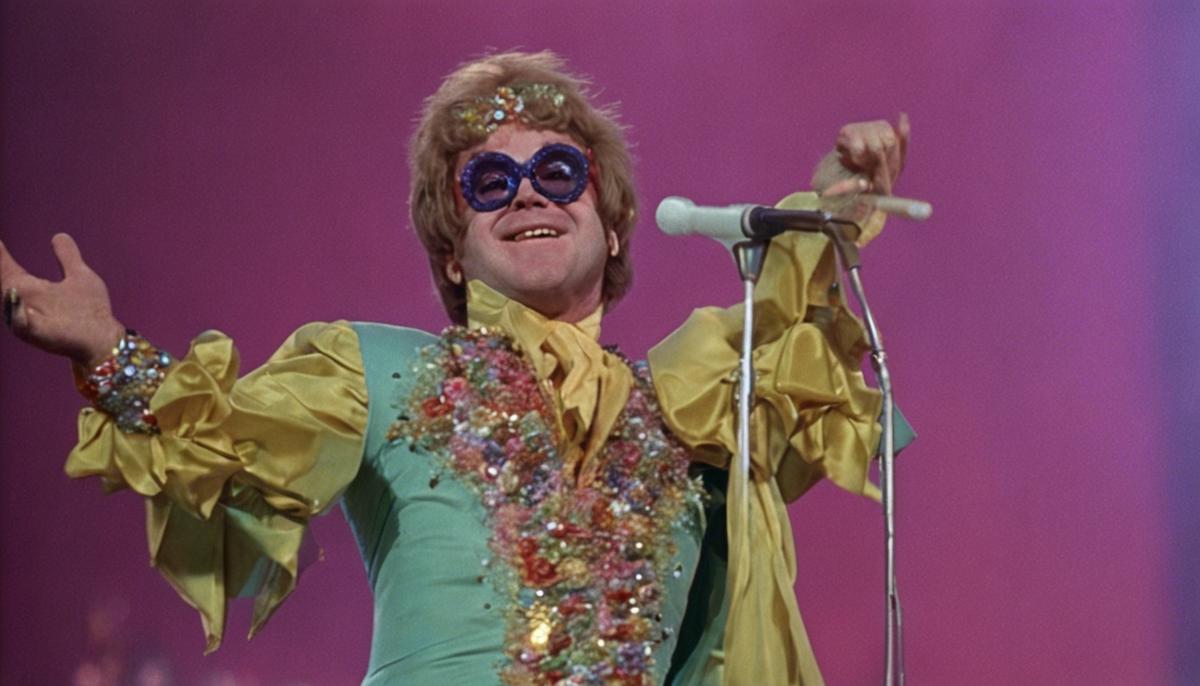
These musical icons and their indelible impact on both culture and industry share an unwavering optimism at their core. This sense of hope amidst adversity shines in their work, reminding us that music has always been more than sound—it's a beacon guiding us toward brighter days. The enduring legacy these artists have crafted serves as a testament to music's power to inspire change and foster connection across time.
Get high quality content written by Writio! This article was crafted by Writio.
Leave a Reply